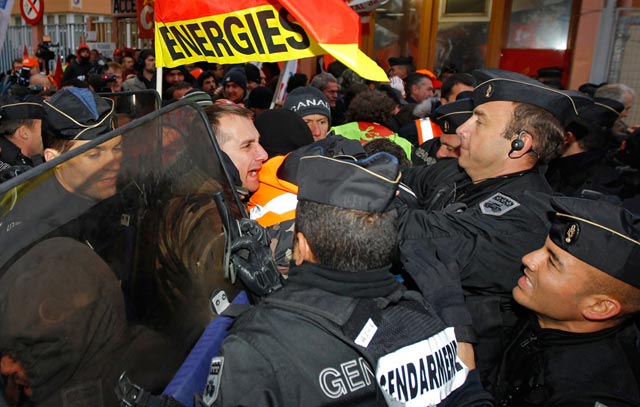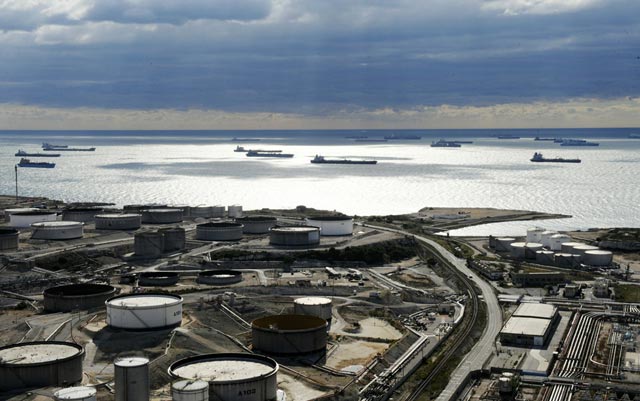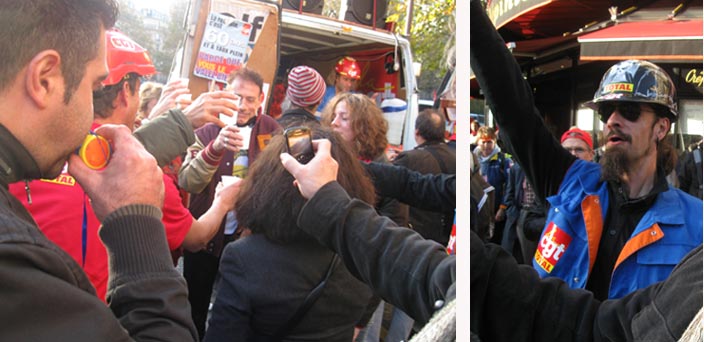
October 2010

Striking workers at the Grandpuits refinery outside Paris during attack by gendarmes (paramilitary riot
police) on October 22. Strikers held firm, shutting down fuel production until union tops moved to end
strike a week later. (Photo: Benoît Tessier/Reuters)
PARIS, October 31 – The very next day after millions marched in the streets of France to oppose the government’s pension “reform” law, top union leaders moved to end the strikes which had shut down all 12 of France’s oil refineries and blocked the key port of Marseille. Early on Friday, October 29, the five refineries still on strike held almost simultaneous votes on whether to continue the strike. Leaders of CGT and CFDT union federations, historically close to the French Communist Party (PCF) and Socialist Party (PS), told refinery workers that the strikes could not be maintained. The ranks then voted to call them off.
Later on Friday, the workers of the oil terminals at the port of Marseille also voted to return to work after 33 days on strike. “A certain number of elements have made it possible to propose resuming activity, which was acted on by the workers,” according to Pascal Galéoté, the head of the CGT union representing port workers at the terminals in the Marseille area (Le Monde, 31 October). The strike had been totally effective, with 79 oil tankers and 4 barges sitting in the harbor waiting to be unloaded, some of them since the end of September, blocking five refineries (one in Switzerland), at a cost of €10,000 to €20,000 (roughly US$14,000-$28,000) a day per ship and losses of €35-40 million (US$48-55 million) to the oil companies.
Anyone with any critical faculty had to ask:
- What were these “elements” which “made it possible” to overcome the bargaining impasse and lift the siege of the port? Neither the port authority nor the unions would say, although management said the deal allowed it to pursue “port reform.” Yet it was precisely against that “reform” that the unions had struck, objecting to plans to allow 40 percent private investment in a subsidiary to operate the terminals. So what’s the story?
- “Why this strange defeat of the refinery strike?” asked a blogger, noting that all 12 refineries had gone back in the last two days (Bellaciao, 31 October). “What kind of blackmail or intimidation were the heroic strikers subjected to?” he asked, noting that everyone who visited a struck refinery recently reported they were “extremely motivated.” Moreover, the strikers were “firmly determined not to give in at this moment, at the beginning of November, when they were finally going to see the country’s gasoline supply dry up.”
At the Feyzin refinery of the French Total oil company outside Lyon, CFDT delegate Damien Galera declared : “The situation was no longer tenable. We made a balance sheet of our forces and observed fatigue, weariness. We also see what’s happening elsewhere: the mobilization on Thursday brought out fewer demonstrators, the other refineries are going back to work, the same with the rail workers. It couldn’t be Total against the rest of France.” This defeatist evaluation sharply contradicted the actual facts. Even Le Monde (29 October) quoted the CGT delegate at the plant, Michael Lavastrou, saying sadly, “They were told to leave their jobs to mobilize, and now they’re being told that it’s all over. That’s not at all clear.”
In fact, we saw workers from the Grandpuits
refinery
about 100 km. outside Paris brimming with energy and determination
during the
march on Thursday (October 28) that brought out some 170,000
demonstrators in
the capital, according to the unions. The Grandpuits van became a focal
point
for union militants at the end of the march. Refinery workers and rail
workers
chanted, sang, blew whistles, danced and vowed to keep up the struggle.
The
amount of popular support they received from everyone was unimaginable,
they
said. So many people brought food to the pickets that they didn’t know
where to
put it. At the same time, they added, other sectors had not gone out,
and they
were under pressure to call off the strike.
Strikes Were at the
Point of Paralyzing French Industry

Tankers
waiting offshore to unload at struck oil terminals in the port of
Marseille, October 17. Port and
refinery strikes were solid until union tops called them off. (Photo: Anne-Christine Poujoulat/AFP)
The fact is that the refinery workers had a powerful stranglehold. The effects of their two-week-long strike were threatening to bring much of French industry to a halt. The oil companies said it had cost them “hundreds of millions of euros.” This was the first time since the 1968 general strike that the whole of the country’s oil refining capacity was shut down. Despite imports of 100,000 tons of fuel a day, stocks were rapidly dwindling (the strategic reserves are mostly unrefined oil). And Belgian unions blockaded a refinery to stop it from supplying tankers from France. What happened was not that the strikes were running out of steam, but that the union bureaucracies were frightened by the prospects of an “uncontrollable” struggle and the mounting denunciations by the government and bourgeois spokesmen. So to show their “responsibility” (to French capitalism), they called off the strikes.
To justify their betrayal, the union tops cited a declining number of demonstrators, and the fact that other sectors hadn’t joined the refinery and port workers. Nonsense. Everyone knew beforehand that the demonstrations on Thursday would be smaller than earlier marches because they came in the middle of a two-week school vacation when many families had left town. The fact that close to 2 million came out anyway for the seventh day of action in as many weeks, full of energy and determination, was remarkable. As for the fact that other sectors didn’t go on open-ended strikes, this was the result of the decision by the labor misleaders not to call them out, and instead leave it up to each group of workers to decide on their own.
At the beginning of the month, union leaders began talking of “renewable” or open-ended (reconductible) strikes. At first, Le Monde (3 October) reported:
“In fact, the CGT doesn’t consider the political and social terrain propitious for open-ended strikes any more than the UNSA and CFDT do, and even less for the general strike which the Solidaires and Force Ouvrière federations say they would like if they had their way…. As for the CGT, it suffered some setbacks in the SNCF (railways) and RATP (Paris Metro) which inclined it toward caution.”
But following the mobilization on October 2, which once again was unexpectedly large, CGT leader Bernard Thibault, declared that “in certain sectors, workers are available for strikes that wouldn’t be limited to 24 hours.” If the government didn’t listen, he said, “the movement could take on a new configuration” after October 12. But, he added, this would be “on the basis of decisions made by the workers” (AFP, 4 October). By putting the responsibility for striking on the workers in the different sectors, rather than calling out the ranks in a united show of force, the union leaders virtually ensured that the walkouts would be restricted to certain sectors.
On Friday, union leaders used the classical excuses of reformists everywhere to justify their sellout. Charles Foulard, the head of the refinery section of the CGT, argued, “We came close to the objective, we only needed a few more occupational sectors to join the strike,” but in any case, “the unions have won the battle of ideas,” because their “arguments on the possibility of having another reform … have been heard” (AFP, 29 October). “The government lost the battle for public opinion,” said CFDT head François Chérèque. This is the same claim put forward by spokesmen for the PS to argue that accounts with Sarkozy can be settled in the 2012 presidential election. Sarkozy himself cynically issued a statement saying “Worries have been expressed, some of them legitimate. I have heard them and am reflecting on them. I will take some steps.” Meaning precisely nothing.
At a local level, the CGT delegate at Feyzin, Lavastrou, even as he doubted that it was all over, repeated the famous phrase of Maurice Thorez in selling out the June 1936 general strike, “Il faut savoir terminer une grève” (you have to know how to call off a strike), although the PCF leader added “once its essential demands have been met.” But today, said Lavastrou, “Going back to work under these conditions,” when refinery workers won nothing after two weeks on strike, “is not going to be pretty.” Even so, said David Faure, the CFDT secretary of the plant committee, “people are only waiting for a sign from the union organizations to go into the streets. The next step is a general strike. And at that point, the response of the workers will be violent.”
It has been an open secret for weeks that the union leaders have been looking for the exit door, but no one wanted to be the first to throw in the towel, for fear of being labeled a traitor, as the CFDT’s Chérèque was rightly called for breaking ranks and selling out the 2003 battle over public sector pensions. Now the sellout has begun, “all together” (tous ensemble) this time, as the striking union leaders act in concert to end the refinery and port strikes. Everything indicates that the Intersyndicale is planning to do the same and call off mobilizations of any sort after the November 6 day of action. “If unity has lasted so far,” Libération (22 October) wrote last week:
“it is also and above all due to the determination of the demonstrators, who are still quite numerous. Because secretly, a number of leaders of national union federations wouldn’t look askance at the mobilization running out of steam in order to call an end to the match…. And the longer the movement goes on, the harder it will be to manage the frustrations of the militants internally….
“On the other hand, some of the rank-and-file militants are beginning to believe in it [the possibility of winning]. And in the absence of a victory, they could end up demanding an accounting from the respective union leaderships. The end of the movement is looking to be difficult.”
Urgently Needed: A
Revolutionary Opposition in the Unions

Striking workers from Grandpruits refinery celebrating at march against
pension law in Paris, October 28. The
next day, union tops called off their strike, falsely claiming workers
were exhausted. In fact, bureaucrats and
bosses feared strike would shut down French industry, which was what
was needed to win. (Internationalist photos)
But who is going to challenge the pro-capitalist union leaders? So far not a word of criticism from the New Anti-Capitalist Party (NPA) or the Solidaires union federation associated with it against the CGT and CFDT for calling off the refinery and oil terminal port strikes. Nor, of course, from the leadership of the Force Ouvrière labor federation under Jean-Claude Mailly, close to the Independent Workers Party (POI) led by ostensibly Trotskyist followers of the late Pierre Lambert. If the “far left” were serious in its occasional references to a general strike, it would loudly denounce this betrayal. But since its actual politics are reformist and its support for a general strike is merely platonic, complicit silence is to be expected.
The World Socialist Web Site of the followers of David North claims that this betrayal only proves “the treachery of the unions” (WSWS, 30 October). By deliberately conflating the pro-capitalist union bureaucracy, who are literally agents of the bosses within the workers movement, with the unions themselves, which are the largest existing mass organizations of the working class, these frauds frequently use leftist language to literally do the work of the employers (for example, opposing union organizing drives). In this case, their calls for organizing “committees of action independently of the unions” means undercutting the urgent necessity to wage a struggle within the unions to oust the sellout bureaucracy.
To pretend, as the WSWS does, that “the unions” are simply capitalist institutions and do nothing but oppose the struggle against the pension reform is to hide the contradictory character of the labor movement, whose pro-bourgeois leaders while acting as conduits for the bourgeoisie are also are subject to pressure from the working-class ranks. All the recent mass mobilizations in France were called by the unions, indeed by the same treacherous bureaucrats who are now stabbing the struggle in the back. The strikes in the refineries and the ports were called by local union bodies. What this struggle shows is not that unions must be opposed, but that even reputed hard-liners, such as Pascal Galéoté of the Marseille dockers and Charles Foulard of the refinery workers, are still bureaucrats, beholden to the capitalist system, and when the chips come down, they will do the bidding of the bosses.
That is why it is crucial to fight within the unions to defeat and drive out not just particular individual leaders but the whole parasitic layer that sits atop, holds back and when called upon betrays the membership they claim to represent. In calling for the formation of elected strike committees as part of the struggle for a real general strike, the League for the Fourth International does so as a means for combating the union misleaders’ stranglehold and fighting for a revolutionary leadership of the workers movement. This requires above all building the nucleus of a proletarian vanguard party to lead the struggle for a workers government based on workers councils, and to fight to reforge the Fourth International as the world party of socialist revolution. ■
To contact the Internationalist Group and the League for the Fourth International, send e-mail to: internationalistgroup@msn.com